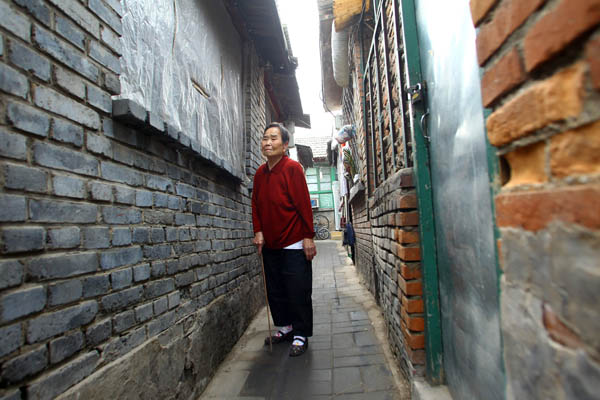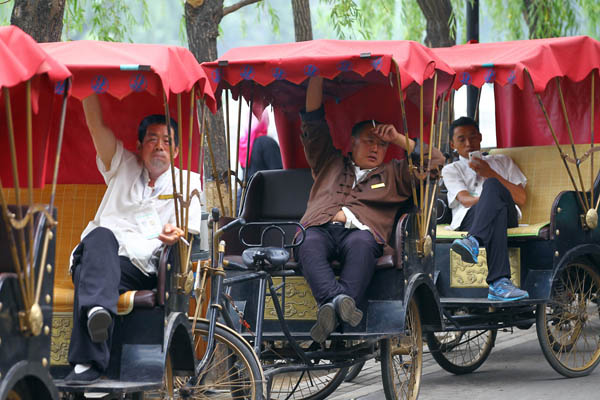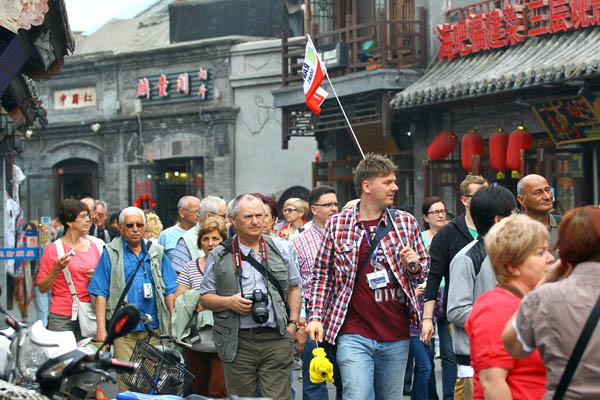
Ancient legacy
The water area of Shichahai was called Haizi before the Yuan Dynasty (1279-1368). With the nearby Beihai Lake becoming an imperial back garden, around 20 temples were built in the area of Shichahai.
In its heyday, Shichahai, which is composed of three lakes, Qianhai, Houhai and Xihai, formed the northern part of the water system of the Grand Canal, which connected Beijing with other cities of China. Wooden boats carried goods from southern China into the imperial capital, making the area a busy commercial center.
 |
|
An elderly woman at the narrow Baimixiejie Hutong. |
The location near the Forbidden City has long attracted many senior officials and celebrities to the area. As a rare waterfront in the capital, it has been a sanctuary for local residents from the daily hustle and bustle for centuries.
However, the downtown area has declined. Today, the aging community is troubled with heavy traffic jams, a jumble of stores and a polluted environment worsened by tourists and an increasing number of residents.
"The heart of the plan is to preserve the area," says Wu Chen, chief architect in charge of the plan.
"When people think of Shichahai, the lakes and bar street come into mind first, which are tranquil and very Beijing. But when you actually go there, you feel annoyed by the congestion," he says after many visits to the area.
"The central axis of Beijing is expected to be included in the Tentative List of UNESCO World Heritage Sites of China, and as the extension of the central axis, Shichahai should regain its glory," he says.
He admits that the project is complicated and takes time because of the density of the population in the area.
 |
|
Rickshaw men wait for customers at the Shichahai area. |
The core issue for restoration is to respect people living there, says He Shuzhong, founder of Beijing Cultural Heritage Protection Center, an NGO based in Beijing.
"You should give the people confidence and stability," he says. "What's the value of history? I think it's all about the people and their stories."
Residents nervous
Residents are concerned about the project. Since May, people have posted thousands of comments on the official weibo of the Xicheng government. Some worry that the Shichahai area will be the next Nanluoguxiang, a former hutong area that's become a commercial market. Some are practical, fearing that even with compensation they can't afford an apartment in the city's skyrocketing housing market. Others are simply attached to their homes.
"My son works nearby and my grandson goes to school nearby. Supermarkets, parks and hospitals are not far, which is very convenient," says Ma. "We don't want our lives to be disturbed."
 |
|
The Shichahai area is a popular tour site crowded with visitors every day. |
"We've heard that the houses near the lakes are nearly 400,000 yuan per square meter," says Ma's wife Meng Zhaohui. "But it's not a money issue. We spent our whole lives here. We don't want to leave our roots."
According to the couple, it's not the first time plans were made to renovate the area. Around 2000, a real estate company came to visit the households of Baimixiejie Hutong, intending to build shopping malls there.
"My neighbors told me not to repair houses because maybe we would be asked to move out the next day," recalls Ma. "But this is my home and I have the duty to maintain it."
Local official Sun says he understands why people are worried, acknowledging that recent large-scale demolitions have wiped out many hutong communities.
The government, he says, believes that "the Shichahai area will have a new look while maintaining its own identity".
For local residents, the Shichahai area is already losing its original charm. "Today the area is very noisy," says Wei Lianyu, 50, who was born and raised in Baimixiejie Hutong.
The public toilet, Wei says, was the first five-star toilet in Beijing with air conditioning and infrastructure. But as more tourists came, the toilet became very dirty, he says, and there are long lines on weekends.
Wei's family lives in a courtyard shared by five families. He says that in his childhood, he knew everyone living in the hutong and they shared food and helped each other. Today he doesn't know new arrivals in the neighborhood.
"We will miss our old neighbors if we have to move to the Huilongguan area of the north Sixth Ring Road," he says. "We have lived here for generations. We don't want to leave. We hope that they can find a balanced way."
